Radio Birdman - Interview with Deniz Tek
by John Clarkson
published: 13 / 10 / 2003
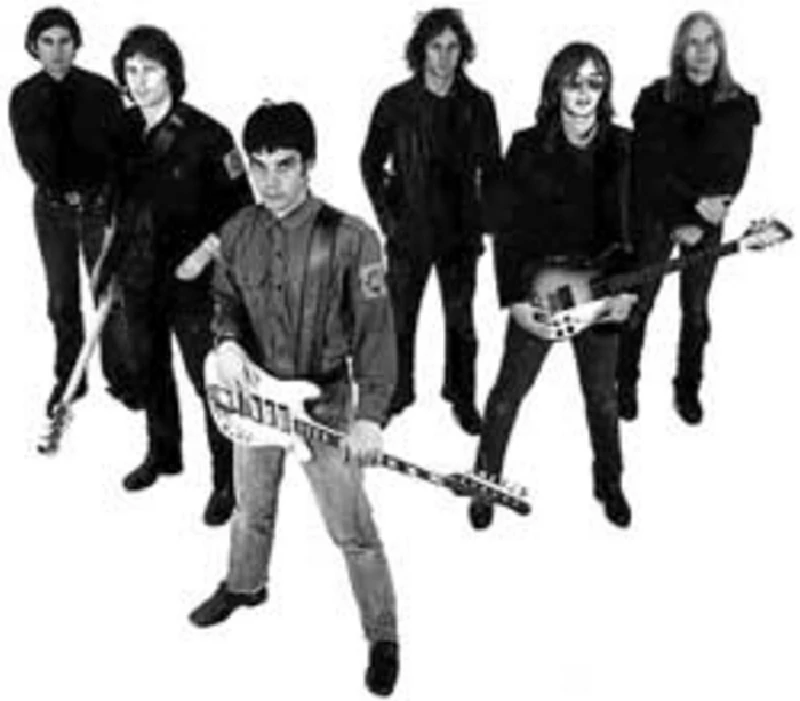
intro
One of the most influential punk bands of the 70's, Radio Birdman recently reformed to play their first tour of Britain in 25 years. Guitarist and founder Deniz Tek talks about the group's past , present and future with John Clarkson
Radio Birdman are one of the most important alternative music acts of the 1970’s. Even now 25 years on from their original split Radio Birdman’s raw, abrasive sound and intense philosophy and ethos of life continues to serve as a prototype and a blueprint for countless punk and garage rock bands. Ottawa’s most successful independent music shop, Birdman Sound, is named in tribute to them . The popular Australian teenage grunge group Silver Chair released in 1997 a cover of one of their songs 'New Race', and every other week another new act rises from out of the ranks, citing them in interviews as a major influence. Since 1996 Radio Birdman, which first formed in 1974 and dissolved in 1978, have frequently reformed . A recent tour of Europe in September, the band’s first since the late 70's, was ecstastically received. Yet in their original lifetime, the group, a Sydney-based sextet, like the Velvet Underground before them, who also only became an influence after their initial break-up, were only a sporadic success. They were also often too the victims of bad fortune. Banned from every venue in Sydney because of their uncompromising attitude, the band, which consisted of Americans Deniz Tek (Guitar) and Philip ‘Pip’ Hoyle (Keyboards, Guitar) ; Canadian Chris Masuak (Guitar) and Australians Rob Younger (Vocals), Gilbert Warwick ( Bass Guitar), and Ron Keely (Drums), opened their own club, the Funhouse, in 1975 simply so that they could go on playing gigs. Two years on, however, the Funhouse was forced to close amidst scenes of violence. A chance meeting lead to Radio Birdman signing to the major label, Sire, and releasing a new version of their debut album, ‘Radios Appear’, which had first come out on a local label, Trafalgar. Their contract would be abruptly cancelled though in the midst of a disastrous British tour. While Radio Biirdman would stay together just long enough to record another record, ‘Living Eyes’, in Wales before splitting up acrimonously, that second album would not see release until three years later in 1981. In an exclusive interview, Deniz Tek, the group’s songwriter and leader, spoke to Pennyblackmusic about Radio Birdman and why a quarter of a century on from their original break-up they continue to sway such an influence. PB : Radio Birdman was formed in part as an antidote to the rest of the mid 70’s Australian music scene, a lot of which was pretty dull. You, however come from Michigan originally. Is that correct ? DT : That’s true. I come from Ann Arbor near Detroit. PB : Your musical background , therefore, included MC5 and the Stooges, both of whom came from Detroit. With Radio Birdman did you decide to try to inject some of what you had heard back in America into Australian culture ? DT : I grew up with those bands and must have been 15 or 16 years old when they played originally. The thing that I think was most inspiring about them was their attitude, and that was the thing that I thought I would take away from them when I went to Australia-a certain level of commitment to playing hard, and to playing with a lot of energy. Whatever I have done since then has always reflected that. PB : How did you actually end up in Australia ? DT : I had been there in 1967. My Dad was a university professor and he had a sabbatical year. We spent that year in Australia. The whole family came back to Michigan at the end of it, and I just wanted to go back. I had enjoyed it there, and wanted to be independent from my parents. Going back there served the dual purpose for me of being able to get as far away from them as possible, but also going to a place which I knew and liked . I applied to go to university in Sydney and became an Australian resident. PB : The Stooges and MC5 were obviously a massive influence. Who else did Radio Birdman see as their immediate musical peers ? DT : We didn’t really have anyone that we considered peers in Australia until late ‘76, early ‘77 and punk hit there. Before that from ‘74 right through to ‘76 we were alone there. We felt a kinship for bands like the New York Dolls. We felt like they were kindred spirits of ours. We also listened to a lot of early Blue Oyster Cult and took a lot of infuence from that, especially from their first three albums. After that they veered off in a direction in which we didn’t want to go. Beyond that there wasn’t much else really. PB : In the early days your gigs often met with violent reaction. You often had the plug pulled on you at shows and you were regularly beaten up by the bouncers at whichever club you were playing at. You went on to form your own club, the Funhouse. Was that why you decided to do that ? DT : Yeah ! We didn’t have anywhere to play. We had been banned from every venue in Sydney, and we had got to a point in which we had to hire small church halls, garages and things like that in which to play shows. We would hire them and put our own gigs on, but it was difficult even to do that. We would manage to put a gig on every few weeks and our friends would come, but other than that we wouldn’t really play out. We would usually just play in the rehearsal room, but then we were fortunate enough to hook up with this place called the Oxford Tavern. What started that was Lou Reed was in town and we had heard that he wanted to see us play. We, of course, didn’t have anywhere to play though, and so we talked to the guy in charge at the Oxford and said “We’re really in trouble here. We have to have a place next Friday night and if we play Lou Reed will come” and he said “If Lou Reed will come, I guess that it is okay for you guys to play”. Lou didn’t show up, but it was a good night anyway, and the guy that ran the place told us that we could play again. When the place changed hands a few months later, we approached the new owner and told him that we would be interested in taking over the running the music and booking the bands, and that’s how that happened. PB : How long did the Funhouse last ? DT : It really lasted for a couple of years. From late ‘75 through to the end of 77. PB : Why did you decide to give it up in the end ? DT : It was coming to a natural end anyway. It was like anything else. Things start off in a positive direction and go well for a while, but then tend to deviate. The Funhouse was becoming unmanageable. It was becoming overcrowded and it was also becoming violent and we weren’t happy with that. We sort of outgrew it. Too many people would come to see us play, and it was over capacity and becoming dangerous, so we started playing in bigger places. We went back to our old mode of hiring halls, and began hiring bigger halls as we were regularly starting to get 1500 or 2000 people. Shortly after that we split and went to England. Towards the end of 1977 we moved operations to London. PB : Why did you decide to go there? DT : It was a record company decision. We had signed to Sire. They wanted us to play extensively in England and to record our next album there, so they put us on a plane and we went over there and toured. We must have played 40 or 50 shows in and around England and Wales in the space of 20 weeks and a few in Europe. The idea after that was to go to America and go on tour with the Ramones, Sire, however, pretty much folded. It ran into financial problems and it dropped every band it had except for its top 4 main bands. That happened right as were in England. We were stuck there without a label and without support, and so that was pretty much it. The band ended shortly afterwards. PB : Your first album, Radios Appear’, was recorded on an absolute shoestring in a local Sydney studio, the recording often being snatched in moments when noone else was around .How did you manage from that to pick up a more international profile and to attract the interest of people like Seymour Stein, the label boss at Sire ? DT : It was just luck.Someone had sent Seymour the Saints single, I’m Stranded’ (The Saints, Australia’s othe principal punk band of the time used to play regular gigs at the Funhouse with Radio Birdman-Ed) and he heard that and he liked it so much he actually came to Australia to see them, and, while he was there, someone said “Oh by the way ! If you like the Saints, maybe you’ll like Radio Birdman. Maybe you should go to the Funhouse and see Radio Birdman play”. He showed up at a show, and wanted to sign us on the spot. PB : You decided to re-record ‘ Radios Appear’ though once you signed to Sire. Why did you decide to do that ? DT : The album had been around for about a year, and we didn’t enough songs at that stage to do a whole new album.Seymour, however, wanted to re-release the first Radio Birdman album, but we felt that we could improve on it and so we thought : “Well, we’ve got a few new songs now which are really good. If it’s going to be our entry onto the world stage, we would like to put our best foot forward”. And so we deleted some of the songs on it that we weren’t very happy with and put on some new songs there which we wanted to record and which we had been playing live for about a year or so and thought were really hot . We remixed a couple of the old songs and added four new songs. There’s really two versions, therefore, of that first album. There’s the original Australian release, and there’s the newly improved version, which in retrospect might not have been such a good idea. It would have probably been better to leave the first album as it was and then when we had enough material to go ahead and do a second album which was completely different to the first one. That’s easy to see in retrospect. At the time though it seemed like a good idea to redo it. PB : Despite being dropped by Sire you managed to record a second album ‘Livin’ Eyes’ in the middle of the British tour. How did you manage to do that against such bad odds ? DT : It was scheduled when times were good and the studio booking was never cancelled. I think that Sire would have cancelled it if they had known that we were still going to do it. We just showed up though at the studio in Wales for which the recording had been booked and found out that they hadn’t got around to crossing it off. Sire had overlooked it amidst all the other hassles that it was having. It was in the middle of a big fight with Polygram over its distribution in Europe We recorded it over the space of three weeks. I don’t know if the studio actually got paid for having us. PB : It didn’t come out for several years after that, did it ? DT : Yeah, that’s right. There was noone to release it. We recorded it and it just sat there for three years before Warners finally picked it up in 1981. PB : Yeah ! One of the things that is often said about Radio Birdman that you avoided working to a strict format at concerts, so gigs could really go in any direction. Was it a really integral part of band philosophy to try to avoid making any two performances the same ? DT : Yeah ! The band had a pretty strong ideological side to it, and we always said that we didn’t want to do anything twice again. You’ve done it once, and it’s done. We didn’t want to do it that way again. We were always looking for ways to change things. We would always write each set on the night, and then a lot of the times also on the night would insert things just to add an element of spontaneity to it. In the old days also there was often very little barrier between the audience and the band, and the band was often in the audience and the audience was often in the band. Nowadays the two factions don’t cross over so easily, but in the olden days if people wanted to cross over they could. We could always handle it and it was fine and it would often add something to the show. PB : Do you think that continued when you came to England ? DT : To a point, yeah ! When we first got there I think the audience was more aloof. They had seen a lot of great stuff. The audience in London in particular was exposed weekly to great bands, and so was pretty hard to impress. Without that input which we were used to getting from wild audiences, it was difficult at first for the band to perform up to its original impetus, but, after we had been there for a while, and had got to go back to the same place a couple of times, it was less of a problem We played the Hope and Anchor three times. We played the Marquee twice, and the Nashville twice. When we would go back to those places again, it was better, and by the third time at the Hope and Anchor it was like an Australian gig. People were tearing the place apart. PB : You said when you were on that tour that you played between 40 or 50 dates in the space of 20 weeks. One of the band’s policies was to play extremely hard with all its members playing at maximum intensity at all times. Do you think that played a part in the group’s demise ? DT : Yes, definitely. The stress of doing that brought out personality and character problems which were under the surface already. The physical hardship of it brought those things to the fore. Some of the guys in the band had pretty serious psychological problems to face up to, They were sub-clinical prior to that, and they were very obviously over it during the latter stages of the British tour. It became too much and that was one of the main reasons why the group folded PB : After the collapse of Radio Birdman you formed another band, New Race, who have a legendary status. Who were they ? DT : The first thing after Radio Birdman that I did was a band called the Visitors, and then I came back to America a year after that and hooked up with my old friends, Ron Asheton and Dennis Thompson. Ron was the bassist in the Stooges and Dennis was MC5’s drummer, and we got together to do some playing in Michigan and the idea came up to put a band together for a tour of Australia. The band was originally going to feature Ron’s brother, Scotty, on drums (who had also been in the Stooges-Ed), but for some reason Scotty couldn’t make it and cancelled, and Dennis Thompson was offered the gig at the last minute. And so we put the band together, and rehearsed for a week and it was me, Rob Younger and Gilbert Wrwick from Radio Birdman, Dennis Thompson and Ron Asheton. As we were only together for such a short time to prepare for it , we did a mixture of Radio Birdman songs, and Visitors songs, Blue Oyster songs and one or two MC5 songs and some Stooges material. We collected all this material together anddid a six weeks in Australia. PB : And was your intention just to do the six weeks, and that was it ? DT : Yeah, because we all had other things going on. It was always going to be a one-off project and it was never going to be a full-time band. PB : Radio Birdman first reformed to play some gigs in Australia in 1996 , and you have since gone on to play other reformation gigs. You have always tried, however, to avoid being simply a nostalgia act. How do you think you have managed to achieve that, and to bring something into the 21st century that is as relevant as it was in the 1970’s. DT : I like to think that it has had something to do with the songs being good, and having a lasting quality about them. I think that the band was probably ahead of the game in the 70’s anyway, so it was already doing music of the future then. Things have caught up and in some areas have gone way beyond now.I think that has had something to with it though It is also hard to be a nostalgia act if you never had a hit record. There’s very few people around today who would have seen the band in its original incarnation, so most of the people coming to our gigs are new to the band. As far as Radio Birdman goes, I think that its live manifestation is really where the band lives. I don’t think we have been ever been captured on record very well, but that our live stuff is outstanding,. As that’s new to everybody , it can’t if you haven’t ever seen it be really nostalgic. I think if the band came back every year and had the same set and had the same old songs then it would have been nostalgia within the next year or so, but we have always tried to avoid that. PB : Are you still after all this time trying to do something different with every show ? DT : It’s not as different as it used to be. We still play a different same set every night, but what we need now is new material. If we’re going to keep doing this, we’re going to have to have a batch of new songs. Otherwise there’s not going to be any point to doing it. PB : Is that your intention now ? DT : Yeah, that’s the plan. PB : You attract a lot of very young fans as well as a lotof 40 somethings on tour . Where do you think that young interest has come from ? DT : I don’t really know. I think that it is just music that seems to appeal to young people I guess because it has a lot of energy and it has a spirit about it and it is a bit rebelllious and it’s hard and it’s fast . Kids like that kind of stuff. They will probably have found out about us through somebody’s Dad who has a copy of one of our records in his record collection,. or through Silver Chair. I think not having our stuff readily available is attractive too. We have become a kind of cult band. That’s nothing the band planned because we have’t been around, but the way people become legendary is by simply not being available. They disappear and people talk about their work and, and, as it’s never really been commercially promoted or marketed, it maintains an underground status. PB : You’ve got an important regular job as well. You ‘re based in Montana and are a surgeon , aren’t you ? DT :I'm an emergency medic. PB : How do you manage to balance your musical career and your regular job ? DT : I always have done. For the last 12 years or so I have made an average of two albums a year, either as a solo project or with other groups that I work with and I have done a lot of touring and, like you say, it is just a matter of balance. One of the good things about working in an emergency room is that when you take time off there will always be someone else there to do the work. It’s shift work, so what I do is tell my partners that next April I am going to be taking a tour and they plan for that and so far it had worked out okay. We have another guy in the practice who climbs mountains. He’s been up Everest a couple of times, and he climbs a different 20, 000 metre peak every year which takes about six weeks, so he goes and does that. We all have things that we go and do and we all go and cover for each othe. It often costs money and it’s hard on the family, but it’s something that I have to do. PB : Final question ! You’ve got Radio Birdman still ticking over. What else have you got on the go musically at the moment ? DT : Well, the biggest recent thing is an Angie Pepper album, ‘Res Ipsa Loquitor’ that was releasedin September (Angie Pepper is Deniz Tek’s wife and a singer and musician in her own right-Ed). I did the songwriting and play all the guitars on that, and there’s another one of those which we are working on now. There is an experimental sort of music project that I work on, and I’ll be doing an album with that. I also have a solo band, a three piece in America,called Golden Breed, and that happens from time to time, so there’s plenty of stuff for me to do. PB : Thank you very much !
Picture Gallery:-
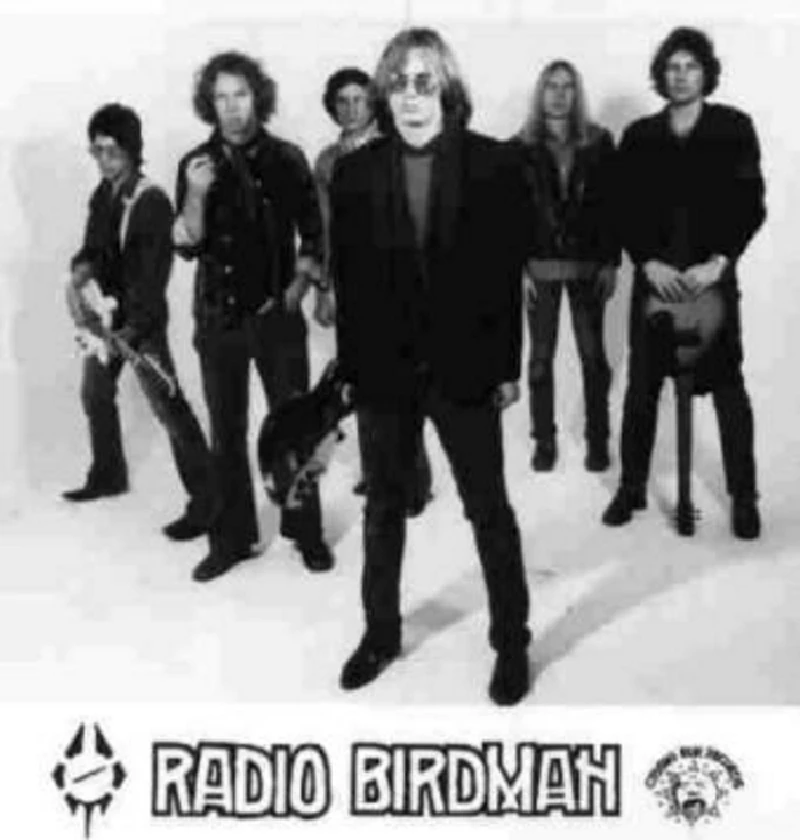
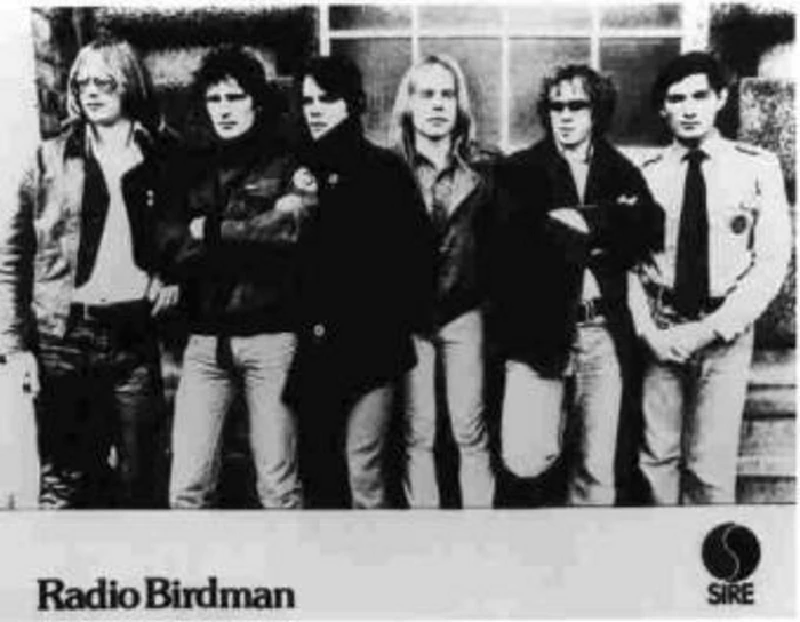
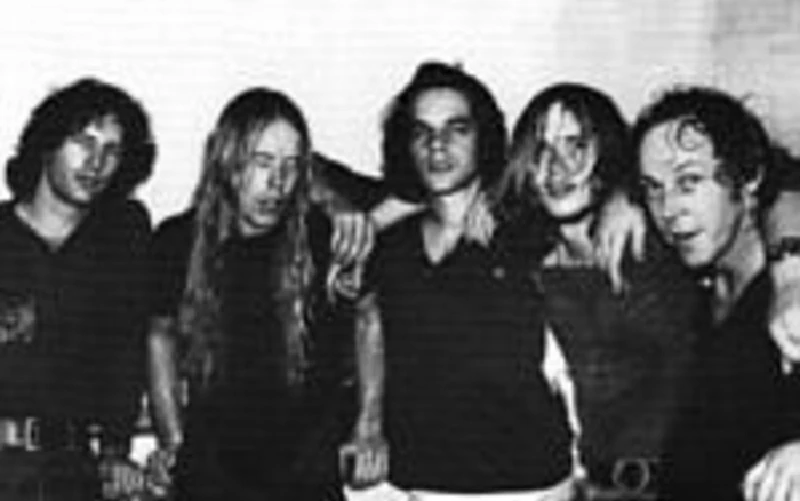
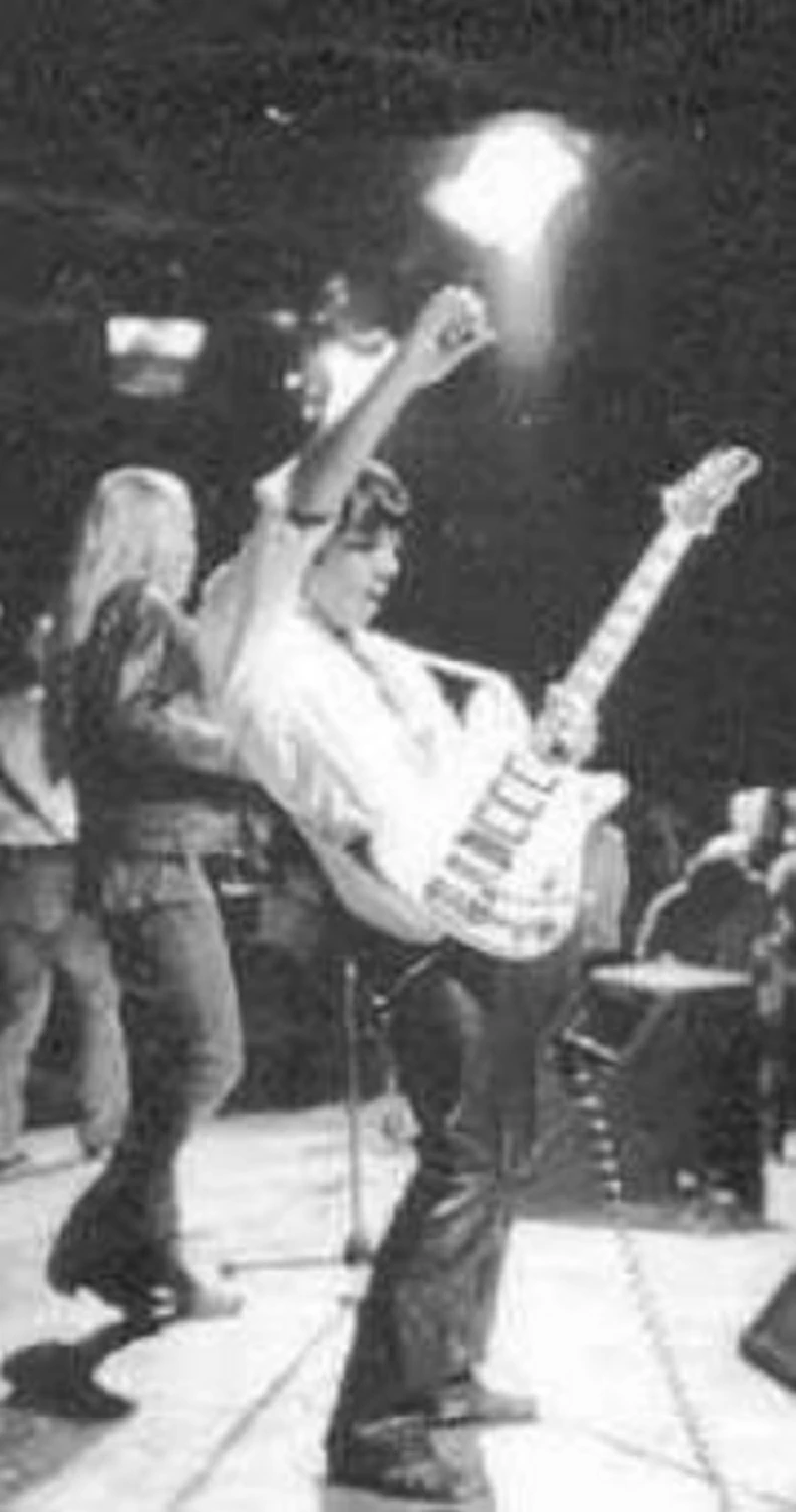
most viewed articles
current edition
John McKay - InterviewCathode Ray - Interview
Robert Forster - Interview
When Rivers Meet - Waterfront, Norwich, 29/5/2025
Spear Of Destiny - Interview
Fiona Hutchings - Interview
Carl Ewens - David Bowie 1964 to 1982 On Track: Every Album, Every Song
Chris Wade - Interview
Shrag - Huw Stephens Session 08.12.10 and Marc Riley Session 21.03.12
Brian Wilson - Ten Songs That Made Me Love...
previous editions
Heavenly - P.U.N.K. Girl EPBoomtown Rats - Ten Songs That Made Me Love....
Manic Street Preachers - (Gig of a Lifetime) Millennium Stadium, Cardiff, December 1999
Allan Clarke - Interview
Oasis - Oasis, Earl's Court, London, 1995
Barrie Barlow - Interview
Beautiful South - Ten Songs That Made Me Love...
Pixies - Ten Songs That Made Me Love...
Chuck Prophet - Ten Songs That Made Me Love...
Dwina Gibb - Interview
most viewed reviews
current edition
Peter Doolan - I Am a Tree Rooted to the Spot and a Snake Moves Around Me,in a CircleVinny Peculiar - Things Too Long Left Unsaid
Garbage - Let All That We Imagine Be The Light
Vultures - Liz Kershaw Session 16.06.88
John McKay - Sixes and #Sevens
Little Simz - Lotus
HAIM - I Quit
Pulp - More
Lapsley - I'm a Hurricane, I'm a Woman In Love
Billy Nomates - Metalhorse
Pennyblackmusic Regular Contributors
Adrian Janes
Amanda J. Window
Andrew Twambley
Anthony Dhanendran
Benjamin Howarth
Cila Warncke
Daniel Cressey
Darren Aston
Dastardly
Dave Goodwin
Denzil Watson
Dominic B. Simpson
Eoghan Lyng
Fiona Hutchings
Harry Sherriff
Helen Tipping
Jamie Rowland
John Clarkson
Julie Cruickshank
Kimberly Bright
Lisa Torem
Maarten Schiethart